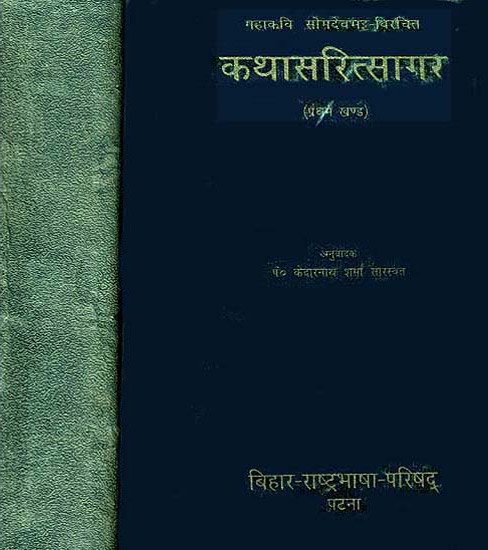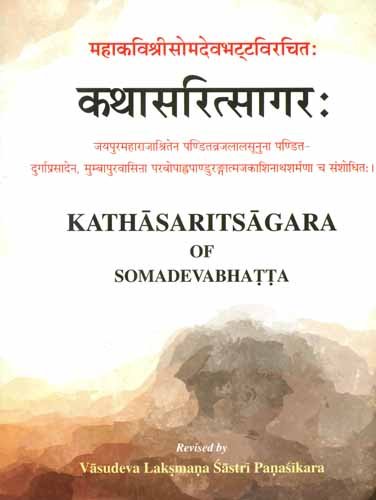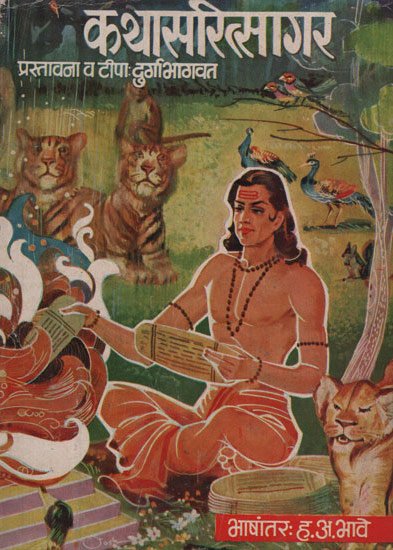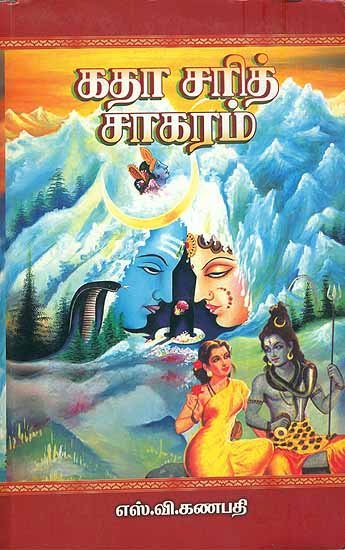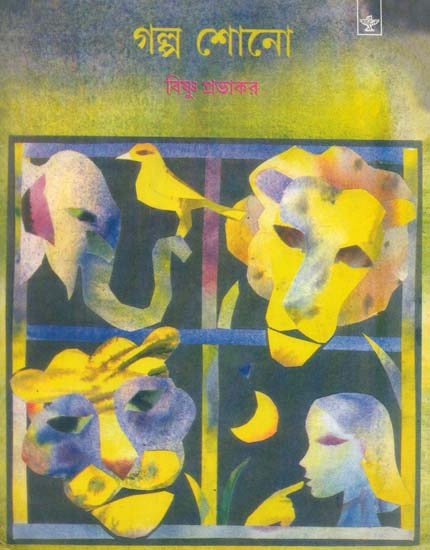Kathasaritsagara [sanskrit]
by C. H. Tawney | 2014 | 226,424 words | ISBN-13: 9789350501351
The Sanskrit edition of the Kathasaritsagara referencing the English translation and grammatical analysis. Written by Somadeva and dating from the 12th century, the Kathasaritsagara (or Katha-sarit-sagara) represents an epic legend narrating the adventures of Naravahanadatta as he strives to become the destined emperor of the Vidyadharas. Alternative titles: (Kathāsaritsāgara, कथासरित्सागर, Kathā-sarit-sāgara)
Verse 18.1.116
स्वछगम्भीरविस्तीर्णम् आशयं महताम् इव ।
तृष्णासंतापशमनं निर्वाणम् इव मूर्तिमत् ॥ ११६ ॥
svachagambhīravistīrṇam āśayaṃ mahatām iva |
tṛṣṇāsaṃtāpaśamanaṃ nirvāṇam iva mūrtimat || 116 ||
The English translation of Kathasaritsagara Verse 18.1.116 is contained in the book The Ocean of Story by C.H. Tawney. This book is available online or you could buy the latest edition:
Read online Buy now! The English translation by C.H. Tawney (2014)
Glossary of Sanskrit terms
Note: This extracts Sanskrit terms and links to English definitions from the glossary, based on an experimental segmentation of verse (18.1.116). Some terms could be superfluous while some might not be mentioned. Click on the word to show English definitions.
Sva, Svan, Chaga, Bhiru, Tirna, Ashaya, Mahat, Mahata, Iva, Trishna, Asantapa, Shamana, Nirvana, Murtimat,
Analysis of Sanskrit grammar
Note: this is an experimental feature and only shows the first possible analysis of the Sanskrit text (Kathasaritsagara Verse 18.1.116). If the system was successful in segmenting the sentence, you will see of which words it is made up of, generally consisting of Nouns, Pronouns, Verbs, Participles and Indeclinables. Click on the link to show all possible derivations of the word.
- Line 1: “svachagambhīravistīrṇam āśayaṃ mahatām iva ”
- sva -
-
sva (noun, neuter)[compound], [vocative single]svan (noun, masculine)[compound]svan (noun, neuter)[compound], [adverb], [nominative single], [accusative single]sva (noun, masculine)[vocative single]
- chagam -
-
chaga (noun, masculine)[adverb], [accusative single]
- bhīravi -
-
bhīru (noun, masculine)[vocative single]
- is -
-
i (noun, masculine)[nominative single]
- tīrṇam -
-
tīrṇa (noun, masculine)[adverb], [accusative single]tīrṇa (noun, neuter)[adverb], [nominative single], [accusative single]tīrṇā (noun, feminine)[adverb]√tṝ -> tīrṇa (participle, masculine)[accusative single from √tṝ class 1 verb], [accusative single from √tṝ class 3 verb], [accusative single from √tṝ class 5 verb], [accusative single from √tṝ class 6 verb]√tṝ -> tīrṇa (participle, neuter)[nominative single from √tṝ class 1 verb], [accusative single from √tṝ class 1 verb], [nominative single from √tṝ class 3 verb], [accusative single from √tṝ class 3 verb], [nominative single from √tṝ class 5 verb], [accusative single from √tṝ class 5 verb], [nominative single from √tṝ class 6 verb], [accusative single from √tṝ class 6 verb]
- āśayam -
-
āśaya (noun, masculine)[adverb], [accusative single]āśayā (noun, feminine)[adverb]
- mahatām -
-
mahat (noun, masculine)[genitive plural]mahat (noun, neuter)[genitive plural]mahatā (noun, feminine)[accusative single]√mah (verb class 1)[imperative active third dual]
- iva -
-
iva (indeclinable adverb)[indeclinable adverb]iva (indeclinable)[indeclinable]
- Line 2: “tṛṣṇāsaṃtāpaśamanaṃ nirvāṇam iva mūrtimat ”
- tṛṣṇā -
-
tṛṣṇā (noun, feminine)[nominative single]
- asantāpa -
-
asantāpa (noun, masculine)[compound], [vocative single]asantāpa (noun, neuter)[compound], [vocative single]
- śamanam -
-
śamana (noun, masculine)[adverb], [accusative single]śamana (noun, neuter)[adverb], [nominative single], [accusative single]
- nirvāṇam -
-
nirvāṇa (noun, masculine)[adverb], [accusative single]nirvāṇa (noun, neuter)[adverb], [nominative single], [accusative single]nirvāṇā (noun, feminine)[adverb]
- iva -
-
iva (indeclinable adverb)[indeclinable adverb]iva (indeclinable)[indeclinable]
- mūrtimat -
-
mūrtimat (noun, masculine)[compound]mūrtimat (noun, neuter)[nominative single], [vocative single], [accusative single]
Other editions:
Also see the following editions of the Sanskrit text or (alternative) English translations of the Kathasaritsagara Verse 18.1.116
Kathasaritsagar
by Kedarnath Sharma Saraswat (2005)
The Only Edition with the Sanskrit Text and its Hindi Translation (An Old and Rare Book) Set of 3 Vol.
Buy now!
Kathasaritsagara of Somadeva Bhatta (Sanskrit Text Only)
by Vasudeva Laksmana Sastri (2013)
Katha Sarit Sagar in Marathi
by H. A Bhave (1995)
Set of 5 Volumes; Published by Varada Books, Pune. 2256 pages (Throughout B/W Illustrations).
Buy now!
Katha Sarit Sagara (Tamil)
by S. V. Ganapati (எஸ். வி. கணபதி) (2014)
[கதா சரித் சாகரம்] Published by Alliance Publications.
Buy now!
Galpa Shono
by Abhijit Chattopadhyay (2014)
[গল্প শোনো] Galpa Shono: Bengali Translation of 'Suno Kahani From Katha Sarit Sagar'; 9788126015436; Published by Sahitya Akademi, Delhi.
Buy now!Preview of verse 18.1.116 in Bengali sript:
স্বছগম্ভীরবিস্তীর্ণম্ আশযং মহতাম্ ইব ।
তৃষ্ণাসংতাপশমনং নির্বাণম্ ইব মূর্তিমত্ ॥ ১১৬ ॥
![Kathasaritsagara [sanskrit] - book cover](/uploads/a/Katha-Sarit-Sagara.jpg)
